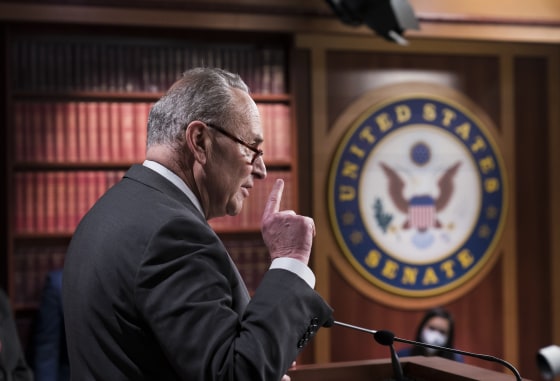WASHINGTON — The Senate early Friday passed a budget resolution that kicks off the special reconciliation process Democrats are using to pass a new round of Covid relief.
The resolution passed in a 51-50 party-line vote just after 5:30 a.m. ET, with Vice President Kamala Harris casting one of her first two tie-breaking votes to help Democrats approve the measure.
The passage of the resolution came after 15 hours of a "vote-a-rama" in the Senate, a lengthy and mostly symbolic series of amendment votes on myriad issues. Senators voted on about 40 amendments during the process, which allows any senator to offer an amendment to the resolution.
Some of the amendments adopted by the Senate include grants for restaurants and bars affected by the pandemic and a provision to prevent tax increases on small businesses during the crisis.
Republicans tried to prohibit an increase in the federal minimum wage in the measure, but a spokesman to Senate Majority Leader Chuck Schumer, D-N.Y., said that would not block the Democratic effort to add a minimum wage provision to the final Covid relief bill because that measure would raise wages over five years. It is unclear whether Senate rules would allow the provision to be added, however. Republicans also tried to prohibit undocumented immigrants from receiving stimulus checks through an amendment, but Democrats stripped that out of the final resolution.
Because the Senate amended the House-passed budget resolution, the version passed Friday morning will now go back to the House, where lawmakers are expected to vote on it quickly.
It comes as President Joe Biden and Democratic leaders coalesce around an effort to pass more aid even without Republican support, forging ahead with a $1.9 trillion package, which includes $1,400 checks.
The vote-a-rama is just one procedural element that will allow Democrats to circumvent the 60-vote threshold for a bill. The budget resolution is nonbinding, meaning it doesn't carry the weight of law. The extended series of votes were on amendments that were largely crafted to test lawmakers' support for a variety of issues but don't affect U.S. policy or law.
In the past, the process has been used as an opportunity for the minority party to force the majority to take tough votes that can be used against them politically in the next election.
"The amendment process here today will be bipartisan and it will be open and it will be vigorous," Schumer said Thursday in a floor speech before voting began. "Democrats and Republicans alike will have the opportunity to share their ideas, and we welcome that."
Download the NBC News app for breaking news and politics
Schumer vowed that Congress will not "think small in the face of big problems."
"We cannot repeat the mistakes of the past," he said. "We cannot do too little. We cannot lock our country into a long and slow recovery."
Republicans offered amendments to support the Keystone pipeline and bar stimulus payments for immigrants in the U.S. illegally, which received some support across the aisle, but Democrats ultimately stripped them from the final legislation. Republicans also offered a measure to prohibit Covid-19 funds for schools that don't reopen after its teachers are vaccinated, which failed.
"We're going to put senators on the record," said Senate Minority Leader Mitch McConnell, R-Ky. "We’ll see what this resolution looks like on the other side — and what signals Democrats send to the American people along the way."



